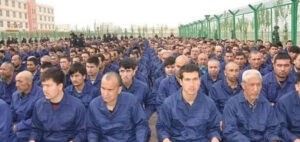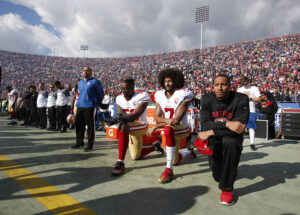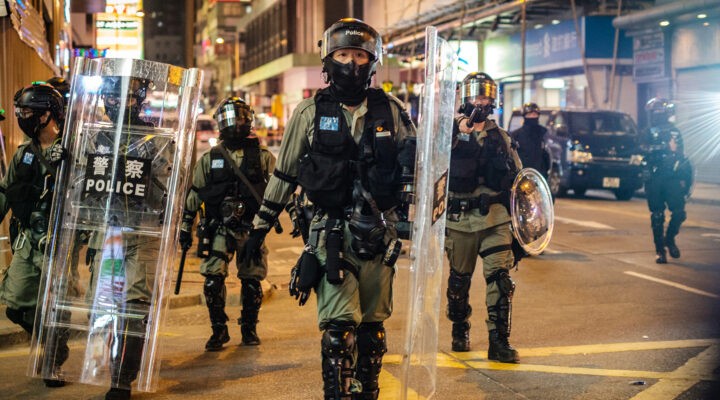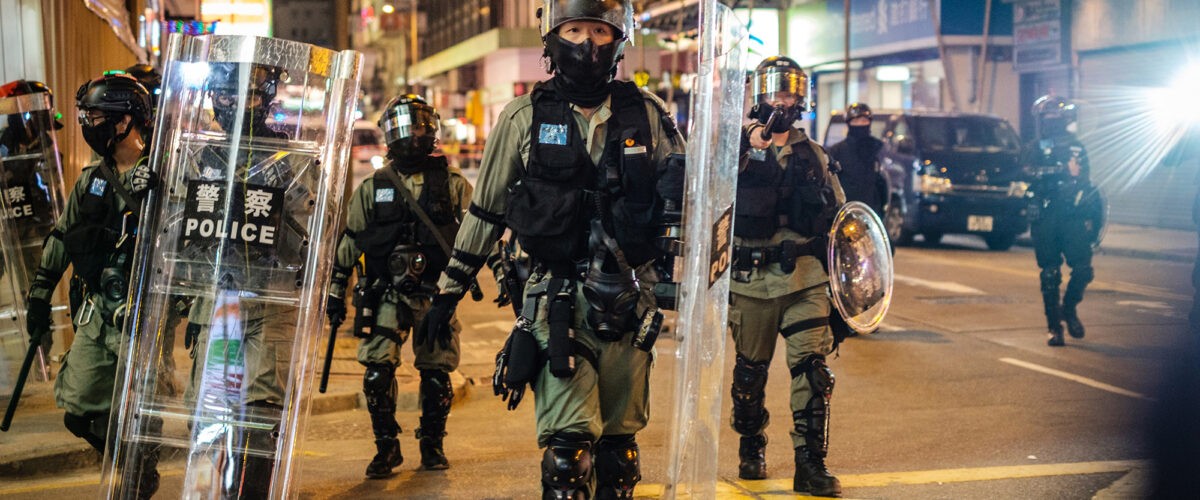A broader-than-usual coalition of religious liberty and human rights groups are praising the Biden administration’s Dec. 6 announcement that the United States will not send a diplomatic delegation to the 2022 Winter Olympics in Beijing.
Although stopping short of a full boycott, the lack of any official U.S. government presence at the Beijing games is expected to send a signal that the U.S. government believes the People’s Republic of China is guilty of heinous human rights abuses and religious persecution, including genocide.
The U.S. Commission on International Religious Freedom swiftly praised President Joe Biden for the diplomatic boycott — just two weeks after the international religious freedom group criticized the Biden State Department for not keeping Nigeria on its list of Countries of Particular Concern.
USCIRF publicly expressed concerns about the Beijing Olympics in its 2020 and 2021 Annual Reports and recommended that the United States not send government officials to the games if the Chinese government’s crackdown on religious freedom continued.
“We commend President Biden for implementing the diplomatic boycott of the 2022 Beijing Olympic games and demonstrating the United States’ unwavering commitment to religious freedom.”
“We commend President Biden for implementing the diplomatic boycott of the 2022 Beijing Olympic games and demonstrating the United States’ unwavering commitment to religious freedom,” said USCIRF Vice Chair Nury Turkel. “The Chinese government’s systematic, ongoing and egregious violations of religious freedom and other human rights of Uyghur Muslims, Tibetan Buddhists, Christians, Falun Gong practitioners, and many others betray the Olympic spirit. In fact, a genocidal regime should not have been granted the privilege to host the Olympics in the first place.”
China — a giant pariah on the world stage for its dictatorial and communist government — came to host the 2022 Winter Games almost by default, illustrating the reluctance or inability of many countries to spend the billions of dollars required for such spectacles.
A detailed report on the news website Vox called the 2022 Winter Olympics “the games no one wanted.”
Six countries initially bid on hosting the games, but four of those dropped out before selection time: Krakow, Poland; Lviv, Ukraine; Oslo, Norway; and Stockholm, Sweden. Vox noted that left the International Olympic Committee facing two fraught choices: Beijing or Almaty, Kazakhstan.
Beijing appeared to be the least-worst option. And besides, Beijing had hosted the Summer Games in 2008 and was thought to be a reliable host if nothing else.
But since that decision was made in 2015, China’s documented human rights and religious liberty violations have only worsened.
“China is one of the worst violators of religious freedom in the world,” said USCIRF Commissioner James W. Carr. “By implementing a diplomatic boycott, the United States and like-minded countries send a strong and unequivocal message to the Chinese government: the international community condemns and does not tolerate its egregious policies that actively persecute religious minorities.”

Detainee in a Xinjiang Re-education Camp located in Lop County listening to “de-radicalization” talks.
Writing for the conservative political think tank The Heritage Foundation, Asian studies expert Olivia Enos explained: “Today, at least 1.8 million Uyghurs are held in political reeducation camps where they are subject to rape and sexual violence, reeducation, and forced labor, among other horrors. The Chinese Communist Party has a stated goal of forcibly sterilizing at least 80% of Uyghur women of child-bearing age. The stories emanating from the camps confirm the world’s worst fears that … Uyghurs are facing ongoing genocide and crimes against humanity.”
Further, Enos explained, the Chinese government “has undermined freedom and liberty in Hong Kong — upending, with the stroke of a pen, the ‘one country, two systems’ framework that had secured the civil and political liberties of Hong Kong residents.”
Although The Heritage Foundation often represents the far-right side of American politics and theology, its critique of Beijing as host to the world’s premier sporting event is shared across the political spectrum.
In the U.S. Congress, both Republican and Democratic officials — including Democratic Speaker of the House Nancy Pelosi and Republican Sen. Mitt Romney — have endorsed some version of a boycott.
Jewish activists in Europe and the World Uyghur Congress in London have joined in calling for a boycott of the Beijing Games.
The website Bitter Winter reported earlier this year on Jewish groups hosting their own version of an Olympic torch relay to protest what they called the “Genocide Games” in Beijing.

Uyghur, Tibetan and Jewish communities join hands over a representative Olympic flame.
Jewish activist Esther Offenberg took the first leg of the torch relay, from London’s Trafalgar Square to Parliament Square, holding up words from Deuteronomy 16:20, “Justice, and only justice you shall pursue.”
Three hundred people reportedly participated in the mock torch relay that involved Jews, Tibetans, Hong Kong residents and Uyghurs.
Bitter Winter reported on the torch carried: “The spiral of silver foil casing wrapped around a central red pillar symbolized the blood of the victims of torture and was carried high above the streams of protesters. Wound with barbed wire protruding flame-like from its mouth, the torch was designed to represent the internment camps and endless reams of razor wire wrapped around every building, school, housing complex and street hoarding in Xinjiang.”
Writing for the libertarian Cato Institute in April, civil liberties expert Doug Bandow acknowledged the need for the democratic world to stand up to China’s brutal leaders but questioned whether a boycott would have any effect.
“Advocates should recognize that the (People’s Republic of China) will not change its policies even if America and some number of other nations stay home,” he wrote. “Regime preservation is Beijing’s most important objective, and the worsening repression is intended to buttress the system. China will pay a very high price to maintain control.
“Moreover, the regime cannot afford to back down in full view of the world,” Bandow added. “To the contrary, the Xi government would do its best to face down any criticism. Public surrender would trigger popular antagonism and … criticism that could cost Xi his job. Perceived weakness also would encourage new and fiercer foreign criticism and punishment.”

Eli Harold #58, Colin Kaepernick #7 and Eric Reid #35 of the San Francisco 49ers kneel on the sideline, during the anthem, prior to the game against the Los Angeles Rams at the Los Angeles Coliseum on December 24, 2016, in Los Angeles, California. (Photo by Michael Zagaris/San Francisco 49ers/Getty Images)
What’s not yet evident is whether any Olympic athletes will stage their own boycotts of the Beijing Olympics — a high-stakes version of NFL player Colin Kaepernick kneeling during the National Anthem to protest racial inequality in America. One big difference if any Olympians do protest is that — unlike with Kaepernick and the National Anthem — they’ll have America’s conservatives on their side.
There’s also one notable example of an American athlete not boycotting a controversial Olympics venue and yet making a point about human rights.
In 1936, an effort to boycott the Summer Games in Berlin — on the cusp of World War II — faltered despite the already emerging atrocities of the Nazi regime. One of the athletes who went to Berlin anyway was Jesse Owens, a Black man, who won four gold medals and was the most successful athlete at the games.

Jesse Owen at the 1936 Olympics in Berlin.
His triumph was considered a victory for racial equality and a refutation of Hitler’s doctrine of Aryan supremacy. Ironically, after returning to the United States, Owens said he was “snubbed” by then U.S. President Franklin D. Roosevelt, who did not invite Owens to the White House to shake Roosevelt’s hand.
In Germany, Hitler and the Nazis were humiliated but unbowed. Their anti-Semitic policies and practices just became less visible, and the global propaganda intensified.
“When you look at Berlin in 1936, there is no question Jesse Owens made a mockery of Nazi racial ideology,” John Soares, a professor of history at the University of Notre Dame, told Vox. “But that didn’t convince the Nazis to rethink what they were doing.”
Related articles:
In run-up to Beijing Olympics, China increasing persecution of Christians
Canada labels Uyghur repression ‘genocide,’ but that’s not as exemplary as you might think


